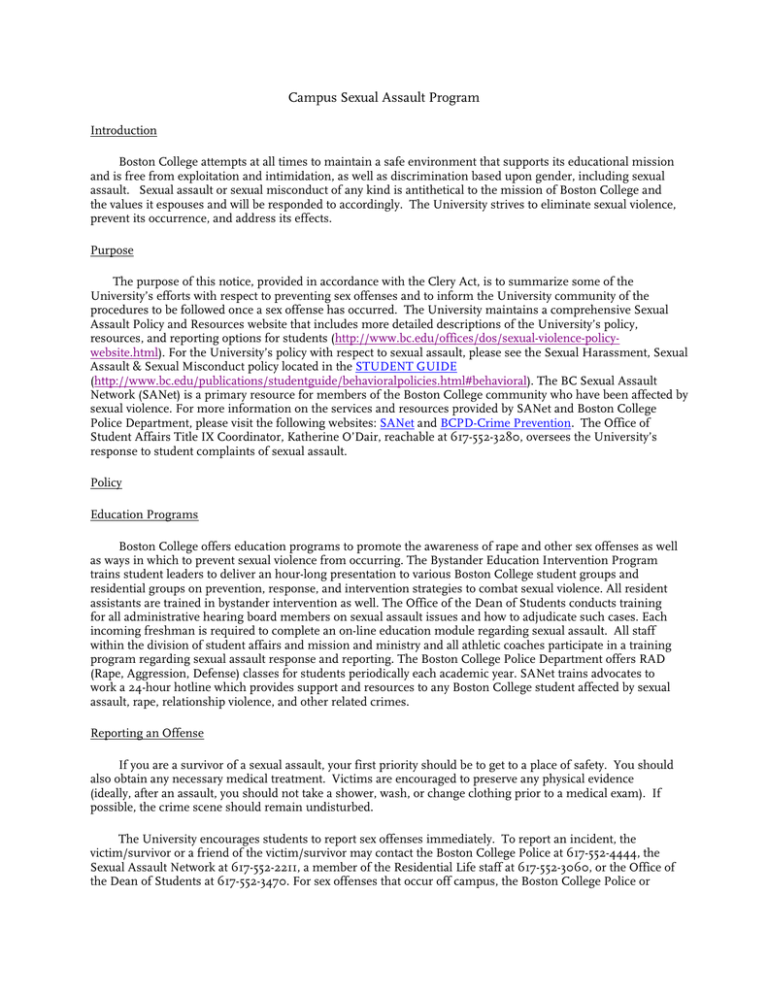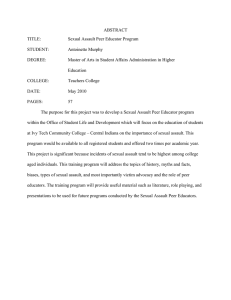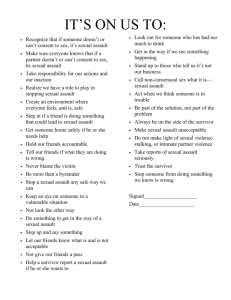
Campus Sexual Assault Program
Introduction
Boston College attempts at all times to maintain a safe environment that supports its educational mission
and is free from exploitation and intimidation, as well as discrimination based upon gender, including sexual
assault. Sexual assault or sexual misconduct of any kind is antithetical to the mission of Boston College and
the values it espouses and will be responded to accordingly. The University strives to eliminate sexual violence,
prevent its occurrence, and address its effects.
Purpose
The purpose of this notice, provided in accordance with the Clery Act, is to summarize some of the
University’s efforts with respect to preventing sex offenses and to inform the University community of the
procedures to be followed once a sex offense has occurred. The University maintains a comprehensive Sexual
Assault Policy and Resources website that includes more detailed descriptions of the University’s policy,
resources, and reporting options for students (http://www.bc.edu/offices/dos/sexual-violence-policywebsite.html). For the University’s policy with respect to sexual assault, please see the Sexual Harassment, Sexual
Assault & Sexual Misconduct policy located in the STUDENT GUIDE
(http://www.bc.edu/publications/studentguide/behavioralpolicies.html#behavioral). The BC Sexual Assault
Network (SANet) is a primary resource for members of the Boston College community who have been affected by
sexual violence. For more information on the services and resources provided by SANet and Boston College
Police Department, please visit the following websites: SANet and BCPD-Crime Prevention. The Office of
Student Affairs Title IX Coordinator, Katherine O’Dair, reachable at 617-552-3280, oversees the University’s
response to student complaints of sexual assault.
Policy
Education Programs
Boston College offers education programs to promote the awareness of rape and other sex offenses as well
as ways in which to prevent sexual violence from occurring. The Bystander Education Intervention Program
trains student leaders to deliver an hour-long presentation to various Boston College student groups and
residential groups on prevention, response, and intervention strategies to combat sexual violence. All resident
assistants are trained in bystander intervention as well. The Office of the Dean of Students conducts training
for all administrative hearing board members on sexual assault issues and how to adjudicate such cases. Each
incoming freshman is required to complete an on-line education module regarding sexual assault. All staff
within the division of student affairs and mission and ministry and all athletic coaches participate in a training
program regarding sexual assault response and reporting. The Boston College Police Department offers RAD
(Rape, Aggression, Defense) classes for students periodically each academic year. SANet trains advocates to
work a 24-hour hotline which provides support and resources to any Boston College student affected by sexual
assault, rape, relationship violence, and other related crimes.
Reporting an Offense
If you are a survivor of a sexual assault, your first priority should be to get to a place of safety. You should
also obtain any necessary medical treatment. Victims are encouraged to preserve any physical evidence
(ideally, after an assault, you should not take a shower, wash, or change clothing prior to a medical exam). If
possible, the crime scene should remain undisturbed.
The University encourages students to report sex offenses immediately. To report an incident, the
victim/survivor or a friend of the victim/survivor may contact the Boston College Police at 617-552-4444, the
Sexual Assault Network at 617-552-2211, a member of the Residential Life staff at 617-552-3060, or the Office of
the Dean of Students at 617-552-3470. For sex offenses that occur off campus, the Boston College Police or
SANet will assist the victim in notifying the appropriate local law enforcement agency for the jurisdiction in
which the crime occurred.
If you choose to report the incident to the Boston College Police, a specially trained officer will conduct an
investigation which involves asking you to describe the assailant and what happened. The officer may ask
questions about the scene of the crime, any witnesses, and what happened before and after. The officer will
collect any evidence, including assisting you to a hospital to have a sexual assault evidence collection kit
performed if you choose, and will assist you in meeting with a Victim Witness Advocate. If you choose to speak
with the District Attorney’s Office or the Dean of Students, the officer will assist you in meeting with them.
The officer will support you through the investigation process.
Boston College recognizes the importance of offering victims of sexual assault immediate treatment,
counseling support, and assistance. In addition, appropriate interim measures to help assure the safety and
well being of the victim will be offered through the Office of the Dean of Students. The University will provide
the complainant with written notification of survivor options, including information about filing a complaint
within the University, information about filing a criminal complaint and information about pursuing both
options at the same time. This notification will also include a listing of resources and supportive services
available to the complainant both on and off campus.
If the crime is considered to represent a serious danger or ongoing threat to members of the Boston
College community, the Boston College Police will disseminate a timely warning.
Counseling/Mental Health/Student Services
The victim of a sex offense is informed by the Boston College Police or SANet advocate about the
counseling, mental health, and student services that are available on campus and in the community. Among
the services available are the following:
•
•
•
•
Routine access to the services of University Counseling;
Emergency psychological services available 24 hours per day;
Referral to counseling and mental health services outside the University; and
Assistance provided by the District Attorney’s Victim/Witness Advocate Program.
A fuller list of available resources is included on the Sexual Assault Policy and Resources website
(http://www.bc.edu/offices/dos/sexual-violence-policy-website.html).
Disciplinary Action/Sanctions
On-campus disciplinary action is the responsibility of the Office of the Dean of Students. The procedures
for on-campus disciplinary action in cases of an allegation of a sex offense are outlined in the “Student Conduct
System” section of the STUDENT GUIDE. These procedures clearly state that the accuser and the accused are
entitled to the same opportunities to have an advisor and witnesses present during a campus disciplinary
proceeding, and that both the accuser and the accused are to be informed of the outcome of any campus
disciplinary proceeding brought alleging a sex offense. This section of the STUDENT GUIDE also lists the
possible sanctions that may be imposed following a finding of “responsible” at a disciplinary proceeding related
to rape, acquaintance rape, or other sex offenses, which include suspension and dismissal from the University.
Changes to Academic and Living Situations
Following an alleged sex offense, if so requested by the victim and if such changes are reasonably
available, assistance in changing academic situations is provided by the Office of the Dean of Students in
conjunction with the appropriate academic dean, and assistance in changing living situations is provided in
conjunction with the Office of Residential Life. In situations in which the alleged assailant seriously disturbs
or presents a potential threat to the victim, a University stay away order prohibiting the alleged assailant from
having any contact with the victim may be imposed. In situations in which the alleged offender may pose a
threat to the victim/survivor, the Dean of Students or designee may also impose on the alleged offender a
summary suspension from either housing or the University, pending final resolution of the matter.
September 25, 2012





